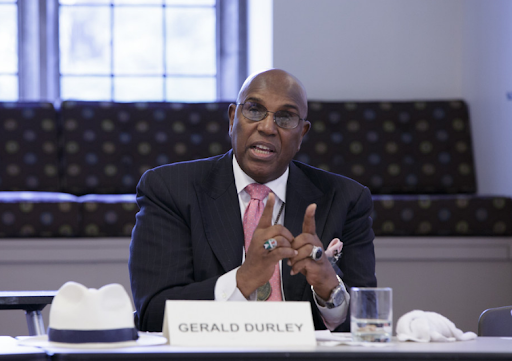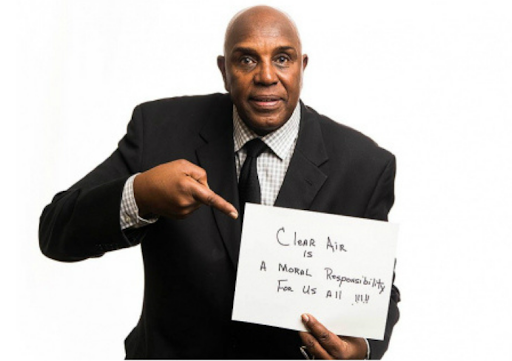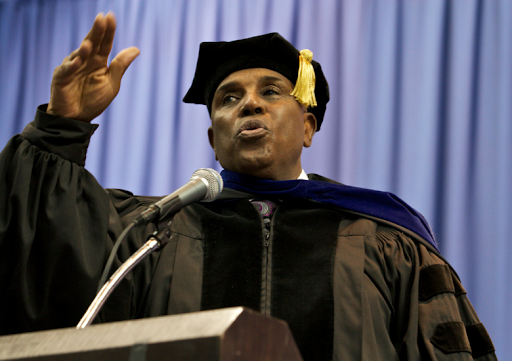Embracing Hope and
Enthusiasm with
Rev. Dr. Gerald Durley
by Rachel Dennis ([email protected])
The profoundly inspirational hymn “I Am On The Battlefield For My Lord” serves as a powerful reminder of our commitment to God, humanity, and our planet. It urges us to pursue liberty, righteousness, and compassion in our daily efforts. Rev. Dr. Gerald Durley takes these words of praise to heart, and further challenges us with a deeper question: “Although you are on the battlefield, are you actively engaging in the battle itself?”
Dr. Durley’s rich history has spanned the civil rights movement, the first US Peace Corps mission to Nigeria, serving as Pastor Emeritus of the Providence Baptist Church of Atlanta, and his current work with Interfaith Power & Light. Enthusiasm—a word derived from the Greek “in theos”, further translating to “in God”—is at the core of his work. Dr. Durley believes that by being in relationship with God we bring enthusiasm and excitement back into human, civil, and ecological rights.
Dr. Durley’s relationship with the church began as a young child. He was born in Wichita, Kansas, then his family relocated to Bakersfield, California, where his father served as a minister. They later relocated to Denver, Colorado, where young Mr. Durley developed a passion for basketball. When he was recruited to play for Tennessee State University, little did he know he was about to connect with his path of purpose and destiny by navigating his place in a world filled with prejudice and injustice.
He was immediately exposed to the institutional racism that saturated this area of the South in the 1960s. He remembers vividly a moment while crossing over the Tennessee border during his relocation—the bus driver “forcefully instructed” him to move to the back of the bus. The rules were different here and that was made clear quite quickly.
Other elements of segregation immersed Mr. Durley in the systemic racism of Nashville, such as segregated water fountains and restaurants. He would not have access to many of the same resources that fellow white residents had and he began his work with the civil rights movement at the age of 18. Mr. Durley advocated for legislative and civil access alongside John Lewis, C.T. Vivian, and Rev. Dr. Martin Luther King, Jr. In 1963 he led a group of students at the March on Washington, where Dr. King delivered his iconic “I Have A Dream” speech.

Despite making powerful and inspirational connections in the civil rights movement, Mr. Durley struggled with witnessing the cultural and social injustices occurring across the nation. Deeply saddened by the state of American politics, and in part as a response to the John F. Kennedy assassination, he decided in 1966 to become one of the first volunteers to serve in Nigeria through the US Peace Corps.
Upon his return to the states, he received his master’s degree in psychology from Illinois as well as a doctorate in psychology from Massachusetts. While these studies deeply enriched his ability to perceive and understand the undercurrents of humanity, he noted that “something was amiss with all of the psychological malice we have”. He then pursued his masters of divinity at the Howard University School of Divinity. This was the missing puzzle piece to Rev. Dr. Durley’s mission. He now began to strategize how to put civil rights and human rights together under a faith umbrella.
Powerful environmental allies came into Dr. Durley’s life at this point, adding a third pillar to his faith-based activism. His work with Ted Turner and Jane Fonda helped to bring environmentalism to a mainstream stage and began to create awareness around urgent environmental legislation.
He then met Rev. Sally Bingham, founder and president of Interfaith Power & Light, and began to investigate the religious response to climate change. In her work, Rev. Bingham helped pioneer an idea that faith, civil rights, and environmental rights were a singular and deeply connected moral issue. Through her teachings, Dr. Durley began to experience the deep connectedness of the environment under a divine creator and was profoundly inspired to embrace ecological activism.

Dr. Durley reflects that it took time, commitment, and sacrifice to take on the issues of the planet’s devastation. He had previously felt that this work was reserved for those who had ample amounts of leisure and resources, not for those on the ground floor of change. As Dr. Durley began to more deeply understand the negatively disproportionate impact that environmental racism had in his community, he saw the vital need for this work. This was clearly a civil rights issue, not just a topic for those who were in a place of privilege to avoid the devastating effects of mass pollution.
Interfaith Power & Light also provided Dr. Durley a platform to pursue common goals with a diversity of faith traditions. He believes that the creeds of Christians, Buddhists, Muslims, Jews, and other faiths share a similar goal of providing support for those who are suffering through moral perseverance and a connection to divinity. Dr. Durley states that the devastations of climate change do not discriminate based on faith, race, or class and quotes Rev. Dr. King’s reminder that all must be served in this mission:
“None of us are free until we are all free.”
Dr. Durley has continued to enthusiastically collaborate with Interfaith Power & Light for nearly a decade. In the past four years, he has advocated for environmental legislation for over 40 states and 22,000 houses of worship. He specifically notes that ecological challenges are most dire for African American communities, noting that “They contribute the least to pollution issues yet suffer the most from environmental change.”
Dr. Durley believes we have a constitutional right to clean air, clean water, and energy efficiency. He no longer sees a distinction between categories of human civil rights and believes that the faith community can and must take responsibility for the survival of our planet.
“Voting, legislation, and access to healthcare are all parts of the environmental movement. They come together and all rest upon a moral and ethical spiritual foundation.”
When asked how the discouraged or hopeless individual can rise and make a great change in the world, Dr. Durley shares:
“The key to all faith is hope. Hope in the middle of despair is transformative. Believing in God’s power to create a pristine, clean world lets us know that there is an opportunity to return to our creator for help, support, wisdom, and courage to face present-day environmental issues. Religion provides a moral and ethical basis that creates a balancing force in decision-making. Faith in a moral compass can lead to green jobs that create better opportunities for individuals, corporations, and government agencies to prosper. When you’re a faith-filled person, everyone wins. When you’re greedy, no one wins.”
When pursuing environmental justice, Dr. Durley reminds us to never lose hope, and acknowledge that everything occurs in a cycle. He believes that strength can build generationally, and we gradually begin to be able to bear more responsibility. “Not losing hope is how we find our hope.”
Dr. Durley learned that the heart and the basis of the civil rights movement was inspired by Mahatma Gandhi’s dedication to nonviolence. He believes that real change is only made when we can enlighten, educate, and excite the people. “If something is this important, you better get as excited as possible!”

Dr. Durley also speaks to the dedication needed to remain on the battlefield for justice: “There were two words that kept us motivated in the civil rights movement: sacrifice and risk. What are you willing to sacrifice? What are you willing to risk? Under this new [Biden Harris] administration we are discussing green jobs, the green energy plan, and going back into the Paris Treaty. It’s beginning to take hold, like a planted seed. It needs water, sun, and nurturing to thrive and grow stronger.”
How can we embrace the challenge to accept risk and sacrifice into our lives in order to create change? Dr. Durley urges us to ask ourselves: “Where am I in my personal, professional, psychological, and financial development? If I speak out in support of the environment, will it challenge my blessings? We need to be able to say ‘yes I will do it anyway’ in the face of these challenges. We can’t all do everything, but there is an area where everyone can do something. We are on the same team in the pursuit of the mitigation of climate change.”
Dr. Durley sees how the current media coverage around environmental issues has the tremendous potential for helping younger generations to take climate change seriously. He believes that once we take responsibility on a personal level, we can create change. Understanding our personal relationship with the environment is critical to knowing our role in its improvement and remediation.
“I believe we are all appointed to do a specific thing at a specific time. We don’t need to all understand the scientific data, all the political nuances. Perhaps we just need to remind people to do a good job. People may not understand your position in life, but faith provides the strength to carry through.”
Dr. Durley has been able to find solace and fulfillment by taking reflective moments in nature. His personal relationship with the planet is both refreshing and restorative. He views Earth as a teacher who reminds us how to live a more simple yet impactful life. It helps him to remember small habits that honor the environment and to avoid using an excess of resources. He believes that nature provides the tools for deep emotional and spiritual healing. “Once we return to a harmonious relationship with nature, our mental health will improve.”
Dr. Durley is excitedly awaiting the upcoming United Nations Climate Change Summit (COP26) in Glasgow, Scotland. He questions how our transition from primarily virtual spaces to in-person meetings will manifest as we recover from the COVID-19 pandemic. He is hopeful that this conference will provide opportunities for extended conversations and personal connections that can provide more social sustainability to the civil rights and environmental movements.
“Conferences are so important to keep people inspired. To inspire means to breathe into something. These conferences can inspire people to stay in the battle.”
When asked what members of the Green The Church community can do to continue the legacy of environmental advocacy, he advises a focus on bringing resources and education to the vitally important frontline workers. These individuals are all too often overlooked and under-funded in favor of larger organizational and political agendas.
“To the least, the lost, the left-behind, those kicked to the curb, we all have to be in this. When you get the information, share it enthusiastically so the movement can grow. It’s got to have a grassroots effort, and the people who are impacted the most must be an integral part if we are to be successful.”
You can learn more about Dr. Rev. Gerald Durley’s work by visiting the Interfaith Power & Light website which contains a large selection of resources as well as ways to take action in the environmental rights movement.
“Be not weary in well-doing, for you will reap in due season if you faint not.” —Galatians 6:9

